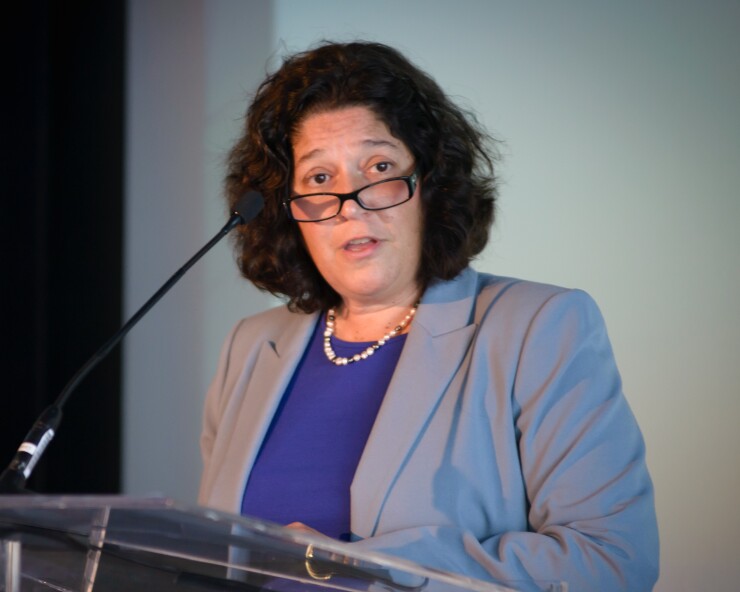WASHINGTON — A New York District Court judge
“Since the OCC has not reached a final ‘fintech charter decision,’ defendants’ … motion is granted as plaintiff has suffered no injury in fact … and because plaintiff’s claims are not ripe,” said Judge Naomi Reice Buchwald in her ruling.
The court dismissed the case without prejudice, however, meaning that there is still a possibility that the New York regulator could re-sue the OCC if it were to actually create a fintech charter in the future.

The state regulator's director, Maria Vullo,
But Vullo argued that the effort exceeded the OCC’s mandate, claiming that the agency’s actions to create a new charter violated not only the National Banking Act but the 10th Amendment to the U.S. Constitution, which relegates all authorities not specifically enumerated as belonging to the federal government to the states.
The OCC responded that no decision has yet been made on whether to offer a fintech charter, and that the successive leaders of the OCC — former acting Comptroller Keith Noreika and current Comptroller Joseph Otting — have expressed some ambivalence about the fintech charter and whether and how it should be offered. Judge Buchwald sided with the OCC, saying that regardless of what the heads of the agency have said, the agency has not issued a final action and therefore there is no injury to which New York can seek restitution.
“All three of plaintiff’s claims are grounded on the premise that there is a ‘fintech charter decision’ subject to challenge,” Buchwald said. “However, the OCC has not yet determined whether it will issue SPNB charters to fintech companies, nor has it received or reviewed any applications for any such charter.”
In a statement following the decision, Vullo expressed hope that the OCC's caution in moving ahead with the fintech charter is a sign that the agency may drop the effort.
"Given the OCC’s statements since DFS filed this suit, we hope that the OCC will abandon its pursuit of the chartering of nondepository institutions," she said.
The decision does not immediately impact another suit brought against the fintech charter by the Conference of State Bank Supervisors. But the judge's decision could potentially influence that case, which generally relies on the same arguments.
The New York regulator maintained in its filings and oral argument that the OCC’s mere declaration that it has the power to issue a fintech charter is an action that New York is able to challenge. Further, the NYDFS said that the OCC had developed a clear path for a fintech company to obtain an OCC charter, which also constitutes a “fintech charter decision” that the court can strike down.
But Buchwald disagreed, saying that OCC’s assertion that it has the power to grant a fintech charter is not an action that is reviewable by the court absent some concrete expression of that assertion. Further, Buchwald said, the argument that there is a process for applications for a fintech charter is belied by not only the OCC’s testimony and statements but by the fact that no fintech firms had themselves submitted an application for such a charter.
“Without a final decision that such licenses will be considered and potentially granted, the application process remains purely hypothetical,” Buchwald said. “Indeed, any potential applicants appear to understand that there is no application process currently in place, as the OCC represents that no fintech company has submitted an application for a … charter.”





